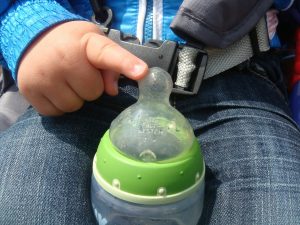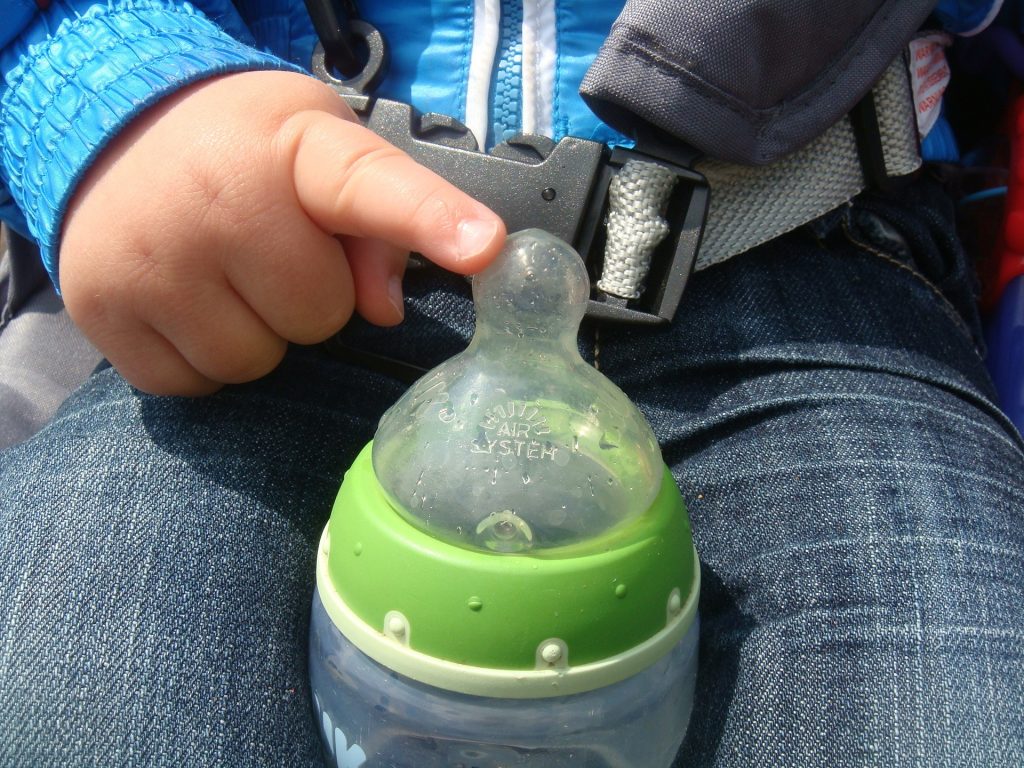Can baby bottles go in the dishwasher? Many folks are unsure if they can clean infant bottles in the dishwasher. Although it looks like a straightforward question, there are some grey areas in the solution. It could appear to be a terrible habit caused by being overly lazy or broke and attempting to save time and money, but it isn’t.

To guarantee that you always have clean bottles for your child, you must understand when and how to wash your baby’s bottles in the dishwasher. Fortunately, this post will answer all your concerns, allowing you to wash baby bottles in dishwasher without ever having to worry about them again.
Let’s begin right away!
Can baby bottles go in the dishwasher?
If you’ve ever raised a child, you’ll agree that they all share one thing in common, in addition to being a source of joy and happiness. They are highly prone to illness.
Sadly, one of the most frequent things that might make your baby ill is a filthy or at the very least badly cleaned feeding bottle.
But the question is, Can baby bottles go in the dishwasher? How precisely should I wash it? Is washing your hands safer? Can you put infant bottles in the dishwasher in this situation?
For washing, baby bottles can be placed in the dishwasher. Many health organizations, including the Centers for Disease Control and Prevention, have endorsed this technique because it produces spotlessly clean parts, including bottle rings, caps, sucking teats, and the actual bottle. This is especially true when the dishwasher’s sanitization feature is used.
What should be put in the dishwasher?
Once your kid is 6 months old or older, any feeding equipment made for babies, including dummies, can be put in the dishwasher. Just make sure the items are marked “dishwasher safe” on the packaging. Particularly, several components of breast pumps should not be cleaned in dishwashers. Dishwasher baskets with specialized designs are useful for organizing small parts of feeding equipment.
Do your baby bottles fit in the dishwasher?
Can baby bottles go in the dishwasher? You must first determine whether the baby bottles you have are dishwasher-safe. Nowadays, the majority of infant bottles are constructed of silicone or plastic, both of which are often dishwasher-safe.
The potential for chemical and microplastic leakage into milk or water from plastic or silicone baby bottles is one of the primary worries that parents have when it comes to cleaning them in the dishwasher.
BPA is not permitted in infant bottles or other containers, according to the FDA, so you don’t need to worry about any dangerous chemicals leaking into water or milk when you wash bottles in dishwasher.
Additionally, the food grade silicone applied to infant bottles is heat-resistant and non-toxic, making it completely dishwasher-safe for washing.
Here is a list of the manufacturer’s recommendations for washing baby bottles in the dishwasher for the most popular brands if you’re not sure if yours are dishwasher-safe:
One of the main concerns that parents have while washing baby bottles in the dishwasher is silicone.
Philips Avent
Are avent baby bottles dishwasher safe? Dishwasher safety applies to all Philips Avent products. Put the product’s little pieces on the top rack of the dishwasher if it has any.
Dr brown baby bottles dishwasher safe
The nipples and vent system are two components of Dr. Brown’s bottle that are dishwasher safe, but only on the top rack.
Can baby bottles go in the dishwasher with Mam brand?
Bottles can be washed in the top rack of the dishwasher at a maximum temperature of 65 C/149 F, however, food coloring may cause component discoloration.
Comotomo
Dishwashers are completely safe for bottles. However, please put them on the top rack to keep them away from the hot coils.
Tommee Tippee
Dishwasher-safe bottles. But put them on the highest shelf. Like any white and transparent plastic items, they may become somewhat discolored and unsightly in the dishwasher (blame that bolognese sauce or carrot soup you had last night). If they do become discolored, there is no need to be concerned because they are quite safe; they simply lose their inviting appearance.
Life Factory
Despite being dishwasher safe on the top shelf, manual washing is advised to fully clean the product’s tiny parts.
Can baby bottles go in the dishwasher with Chicco Duo?
Do you need to sterilize baby bottles after dishwasher? You can easily clean bottles because they have few parts and are safe for the dishwasher, bottle warmer, and electric sterilizer.
Important tips when placing baby bottles in a dishwasher
Can baby bottles go in the dishwasher? Yes, absolutely, but keep the following in mind when doing so.
Choose the appropriate software
If you do plan to use your dishwasher for your baby’s feeding supplies, choose a hot program with an operating temperature of 80 °C or higher as opposed to a more leisurely eco wash. Some dishwashers now have a “baby cycle,” a thorough wash designed to clean your child’s feeding utensils of germs. Antibacterial rinses and “hot dry” settings are further offered.
Clean the bottle before placing it in the dishwasher
Until your child is 12 months old, bottles and teats should be fixed. At that point, you should try to wean your child off of bottles and onto cups. Although most infant feeding equipment, including dummies, only has to be sterilized for the first 6 months.
If you do choose to wash bottles in the dishwasher, make sure to spotless them of any milk residue using a bottle brush before stacking them face down to prevent stray food particles from getting inside.
FAQ
Can baby bottles be sanitized in a dishwasher?
Although possible, it is not always essential to sanitize infant bottles in a dishwasher. You may sanitize bottles using boiling water or the microwave if you feel unsafe doing so in a dishwasher.
Can baby bottles go in the dishwasher?
Baby bottles and nipples are acceptable in dishwashers. To be specific, you should review the manufacturer’s instructions.
Are infant bottles dishwasher-safe?
Yes, most infant bottles can be cleaned in the dishwasher. Use the top rack of the dishwasher to prevent damage, and make sure you follow the bottle’s directions.

